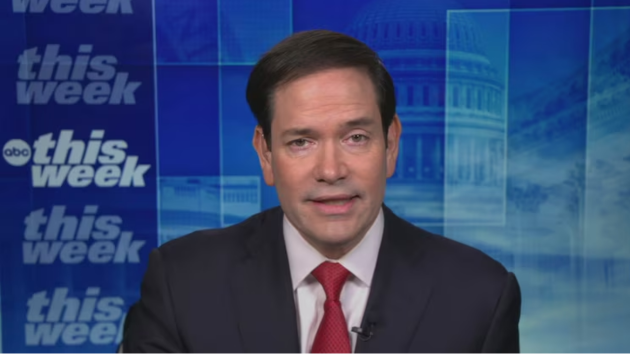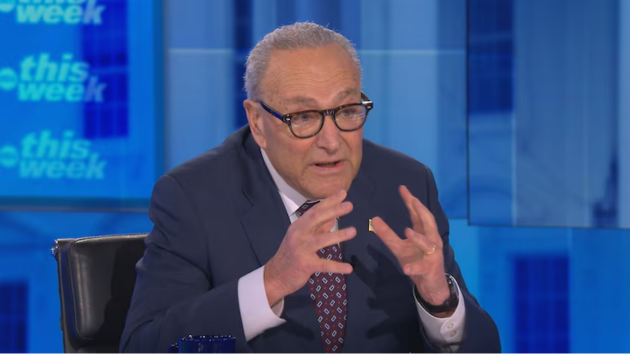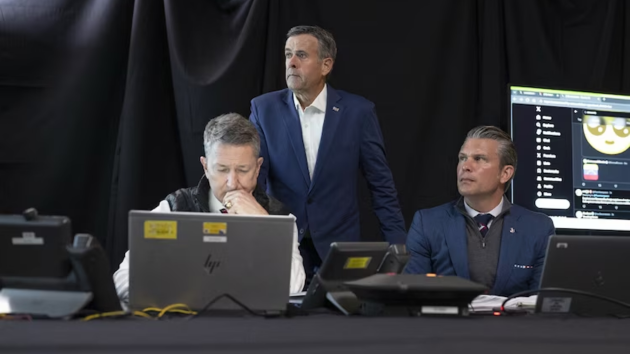Trump to urge universities to ‘monitor,’ ‘report’ Israel-Hamas protesters
Written by ABC Audio ALL RIGHTS RESERVED on February 4, 2025

(WASHINGTON) — President Donald Trump’s executive order aimed at combatting antisemitism calls on institutions of higher education to “monitor for and report activities by alien students and staff” concerning “antisemitism” on college campuses.
Some legal scholars say they’re concerned about what this could mean for free speech on college campuses following more than a year of tension between students, faculty and administrators, while other experts noted that past McCarthy-era cases on communist activity could foreshadow the action’s legal standing.
The main thrust of the executive order’s purpose: “Jewish students have faced an unrelenting barrage of discrimination; denial of access to campus common areas and facilities, including libraries and classrooms; and intimidation, harassment, and physical threats and assault,” the order reads.
The fact sheet released by the White House on the new executive action threatens to “deport” college students in the United States on student visas and other “resident aliens” who expressed “pro-Hamas” or “pro-jihadist” views to “combat antisemitism on college campuses and in communities across the nation.” It calls for immediate action to be taken by the Department of Justice to “quell pro-Hamas vandalism and intimidation, and investigate and punish anti-Jewish racism in leftist, anti-American colleges and universities.”
“It provides like a signaling mechanism and an alibi for university administrators who … want to crack down on Palestinian activism, and now they can point to this executive order and use the government as a further pretext for their actions, even though they’re under no legal obligation to do what the executive order says,” said Darryl Li, a legal scholar at the University of Chicago, in an interview with ABC News.
He added that in his legal opinion, “They’re not under a legal obligation to spy on their students and to report their students to the government. They need not, and they should not, cooperate with this executive order.”
However, past Supreme Court cases — particularly during the McCarthy era and the Cold War — found it is within Congress’ power to deport a legal noncitizen resident for their views, advocacy or membership in a political group if it’s in the interest of national security, Nadine Strossen, a Senior Fellow with the Foundation for Individual Rights and Expression (FIRE), told ABC News.
These limitations also impact noncitizens attempting to enter the country, Strossen noted.
“There was this distinction; it’s one thing to say, government may not prosecute you, you may not be subject to civil penalties, but you may still be subject to deportation because of this doctrine that Congress has what’s called plenary power, pretty much unchecked power, with respect to matters concerning who is able to be present in this country and not present in this country,” said Strossen.
On Oct. 7, 2023, the Palestinian terror group Hamas attacked Israel, killing roughly 1,200 people, and around 250 others were taken hostage, according to the Israeli government.
Israel then began its monthslong retaliation on the Gaza Strip, killing more than 47,000 Palestinians, according to Gaza’s Hamas-run Health Ministry.
The United States and the United Nations have not officially declared Israeli action to be a genocide. However, a UN Special Committee report found that Israel’s warfare methods in Gaza were consistent with genocidal tactics.
Protests and around-the-clock encampments concerning the war erupted at colleges and universities around the country.
Pro-Palestinian protesters called for an end to what they called an Israeli “genocide” against Palestinians and criticized the Israeli “occupation” of Palestinian territories. Pro-Israel protesters called for a return of the hostages or were in support of the Israeli effort against Hamas.
Colleges were thrust into the spotlight as they reckoned with charges of antisemitism and Islamophobia, and anti-Israeli, anti-Arab or anti-Palestinian sentiment amid the campus clashes.
Title IV, a law that bans discrimination based on race, color, or national origin in any institution or program that receives federal funding from the U.S. Department of Education, became the center of dozens of investigations across the country.
Students and professors, many of whom were advocating for a ceasefire or pushing for an end to the humanitarian crisis in Gaza, were subsequently arrested at universities and protests across the country. Some were suspended or expelled from their universities, others were arrested for trespassing or disturbing the peace, though many charges were later dropped.
Student protesters critical of the Israeli government’s military actions in Gaza continue to face accusations of antisemitism. But many of the student groups behind the protests – including Jewish activists – have said that individuals making inflammatory remarks do not represent their groups or their values concerning the war in Gaza.
Other Jewish or pro-Israel students around the country have spoken out about the pressures they too have faced, including renewed concerns about safety and acts of hate as law enforcement noted a spike in antisemitic incidents.
Trump’s executive order calls on higher education institutions to familiarize themselves with 8 U.S.C. 1182(a)(3) — which defines “inadmissible” non-citizens for their relationship to alleged “terrorist activities.”
FIRE released a statement against Trump’s executive order, arguing that college campuses are intended to be places of learning and debate over a wide range of issues: “Advocates of ideological deportation today should not be surprised to see it used against ideas they support in the future.”
“This openness, albeit unpleasant or controversial at times, is a defining strength of American higher education,” an online statement read. “It’s one of the features attractive to students traveling from abroad who may hope to take part in the speech protections Americans have worked so hard to preserve. These are protections that they may very well be denied in their home countries.”
International students, or staff members with visas, are in a vulnerable situation because of their status, legal experts say.
“The potential loss of the visa is something that, of course, is devastating to international students. And if your visa is revoked on sort of security or terrorism grounds, it’s kind of like a lifelong — you’re basically banned from the United States for life, even if you have family who are U.S. citizens who live in the United States,” said Radhika Sainath, a senior staff attorney at Palestine Legal, who has advised hundreds of free speech or censorship cases concerning pro-Palestinian supporters.
Legal experts argue the order’s vague language is strategic to smear pro-Palestinian support — though the order doesn’t explicitly state concerns over support for “Palestinians” — which has long been painted as inherently antisemitic or terroristic.
“This is McCarthyist. It’s authoritarian,” said Sainath. “Students are really feeling the breadth already. Before Trump came in — from their own universities — students have been evicted from student housing and been homeless for minor, minor rule violations. They’ve been suspended, they’ve been expelled, they’ve lost scholarships, they’ve lost financial aid. The harm is really, really great, and many of these students are first-generation students. They are low-income students, and it can be quite harmful to be punished again for speaking out against a genocide.”
Copyright © 2025, ABC Audio. All rights reserved.





